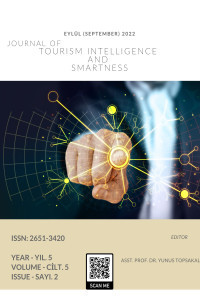ÜNİVERSİTE ÖĞRENCİLERİNİN EKOSENTRİK, ANTROPOSENTRİK VE ÇEVREYE YÖNELİK ANTİPATİK TUTUMLARININ DEĞERLENDİRİLMESİ: AKDENİZ ÜNİVERSİTESİ İİBF ÖRNEĞİ
Günümüzde çevre ve çevreye yönelik algı, tutum
ve davranışların insanların eğitim seviyesinin yükselmesi, kişisel gelir
düzeylerinin artması ve dünya üzerinde herhangi bir yerde gerçekleşen çevresel
tahribatın kitle iletişim araçları sayesinde rahatlıkla kamuoyuna duyurulması
suretiyle değiştiği görülmektedir. Özellikle 1990’lı yıllarla birlikte
Birleşmiş Milletler bünyesinde gerçekleştirilen birçok rapor, konferans ve
protokolde de çevreyi korumaya yönelik yapılması gerekenler devletler bazında
da önemsenmiştir. Ancak bütün bu çabalara rağmen son dönemde ortaya çıkan
birçok çalışma çevreye yönelik tahribatın önlenmesinde en önemli faktörün
devlet politikalarından çok, çevreyle birinci derecede ilişkide bulunan
insanoğlunun sorumlu olduğunu ortaya koymaktadır. İnsanoğlunun bu sorumluluğu yerine
getirmesinde en önemli unsuru da çevreye yönelik tutumu oluşturmaktadır. O
nedenle çalışmamızda çevreye yönelik herhangi bir eğitim almayan, çevresel
ürünlerin sadece üretimi, pazarlanması, işletilmesi, ekonomisi ile ilgili ders
alan İktisadi ve İdari Bilimler Fakültesi öğrencilerinin Ekosentrik,
Antroposentrik ve Çevreye Yönelik Antipatik Tutumlarının ölçülmesi
amaçlanmıştır. Akdeniz Üniversitesi İktisadi ve İdari Bilimler Fakültesi’nden
275 öğrenciye Thompson ve Barton (1994) tarafından geliştirilen ve daha sonra
Siegrist'in (1996) Almanca ‘ya, son olarak ise Sinan ERTEN tarafından Türkçe’ye
uyarlamasının yapılmış olduğu "Ekosentrik, Antroposentrik ve Çevreye
Yönelik Antipatik Tutum Ölçeği" uygulanmıştır. Araştırma sonucunda kız
öğrencilerin ekosentrik ve antroposentik tutum ortalamaları daha yüksek iken
erkek öğrencilerin çevreye yönelik antipatik tutum ortalamalarının daha yüksek
olduğu tespit edilmiştir.
EVALUATION OF ANTECEDENT ATTITUDES OF UNIVERSITY STUDENTS TOWARDS ECOCENTRIC, ANTHROPOCENTRIC AND ENVIRONMENT: AKDENIZ UNIVERSITY FACULTY OF ECONOMICS AND ADMINISTRATIVE SCIENCES
Today, perception, attitudes and behaviors
towards the environment and the environment are seen to change with the
increase of the level of education of the people, the increase of the personal
income levels and the environmental destruction that occurs anywhere in the
world through the mass media. In many reports, conferences and protocols
carried out within the United Nations, especially in the 1990s, the needs to be
done to protect the environment have also been considered on a government
basis. However, in spite of all these efforts, many recent studies reveal that
the most important factor in preventing destruction of the environment is the
responsibility of the human being, who is first in relation to the environment,
rather than the state policies. The most important element in the fulfillment
of this responsibility of the human being is the attitude towards the
environment. For this reason, it is aimed to measure the Antipatic Attitudes of
Ecocentric, Anthropocentric and Environment orientated students of the Faculty
of Economics and Administrative Sciences students who have not received any
education about the environment, only production, marketing, operation and
economics. 275 students from the Faculty of Economics and Administrative
Sciences of Akdeniz University were developed by Thompson and Barton (1994) and
later adapted to German by Siegrist (1996) and finally by Sinan ERTEN to
Turkish. "Ecocentric, Anthropocentric and Environment Antipathic Attitude
Scale "was applied. As a result of the research, it was found that the
average of the students' eccentric and anthropic attitudes was higher than that
of the girls, whereas the average of the antipathic attitudes towards the
students was higher in the male students.
___
- Aron, A., Aron, E.N. & Coups, E.J. (2008). Statistics for the Behavioral and Social Sciences a Brief Course. Pearson International Edition, Upper Saddle River, England.
- Atlı, K.., Uzun, N., Saraç, C., Sağlam, N. & Sağlam, S. (2014). The Education During The Announcement Period Of Republic Within The Construction And Trnsformation Period. International Journal of Innovative Research in Education, 2(1): 39-47.
- Aymankuy, Y., Polat, E., Buzlukçu, C. & Aymankuy, Ş. (2016). Çevresel Tutumların Satın Alma Davranışları Üzerindeki Etkisi: Potansiyel Yerli Turistler Üzerinde Bir Araştırma. Akademik Bakış Dergisi, 58: 310-326.
- Birden, B. (2016). Çevre Etiğinde Bireyin Ahlaki Sorumluluğuna Kısa Bir Bakış. Türkiye Biyoetik Dergisi, 3(1): 4-14.
- Bozdemir, H. & Faiz, M. (2018). Öğretmen Adaylarının Çevreye Yönelik Ekosentrik, Antroposentrik ve Antipatik Tutumları. Sakarya University Journal of Education, 8(1): 61-75.
- Büyüköztürk, Ş. (2006). Sosyal Bilimler İçin Veri Analizi El Kitabı, İstatistik, Araştırma Deseni SPSS Uygulamaları ve Yorumu. Pegem Yayıncılık, Ankara.
- Erten, S. (2007). Ekosentrik, Antroposentrik ve Çevreye Yönelik Antipatik Tutum Ölçeğinin Türkçeye Uyarlama Çalışması. Eurasian Journal of Educational Research, 28: 67-74.
- Gercek, C. (2016), Üniversite Öğrencilerinin Çevre Etiğine Yönelik Algıları. Elektronik Sosyal Bilimler Dergisi, 15(59): 1100-1107.
- Karakaya, Ç. & Çobanoğlu, E. O. (2012). İnsanı Merkeze Alan (Antroposentrik) ve Almayan (Nonantroposentrik) Yaklaşımlara Göre Eğitim Fakültesi Son Sınıf Öğrencilerinin Çevreye Yönelik Bakış Açıları. Türk Fen Eğitimi Dergisi, 9(3): 23-35.
- Karasar, N. (2004). Bilimsel Araştırma Yöntemleri. Nobel Yayınevi, Ankara.
- Kayaer, M. (2013). Çevre ve Etik Yaklaşımlar. Siyaset, Ekonomi ve Yönetim Araştırmaları Dergisi, 1(1): 63-76.
- Sirkin, R. M. (2006). Statistics for The Social Sciences. SAGE Publications, London.
